The Daily Agenda: From AZ to DC
Arizona's cowboy poet has a spine of steel ... Budget breakthrough or breakdown? ... And subtweeting your opponent's signs.
As lawmakers hunkered down for budget battles yesterday, Arizona House Speaker Rusty Bowers took the national stage for an emotional testimony over how he stood up to former President Donald Trump and others in his party to protect the 2020 election results.
Bowers told the January 6 committee all the times he heard from Trump and his associates after the 2020 election, saying largely what he’s said publicly, though sprinkled with elements of how his faith plays into his role as a lawmaker, the protests outside his home and raw journal entries from that time period.

He shared how he repeatedly asked for evidence of widespread fraud, but never received it, and didn’t believe any hearings, much less anything further, were warranted. He refused to hold a hearing at the House because he feared it would turn into a “circus.”
“I didn’t want to have that in the House,” Bowers told the committee. “I did not feel that the evidence — granted, in its absence — merited a hearing. And I didn’t want to be used as a pawn, if there was some other need that the committee hearing would fulfill.”
Bowers’ appearance followed a statement from Trump, which claimed Bowers had told him the election was “rigged” and that Trump won Arizona. “Bowers should hope there’s not a tape of the conversation,” Trump said, adding that Bowers would have lost his reelection bid without the president’s support. Bowers said he has never, to anyone, at any time, claimed the election was rigged. (And it’s worth noting that Bowers won reelection in his deep-red district by a landslide.)

The Washington Post’s Yvonne Wingett Sanchez spent the day with Bowers, who prepped for the hearing by reading quotes about courage, then headed back to Arizona not only to work on the budget, but to pick up his daughter’s tombstone.
Meanwhile, back at home yesterday, Arizona lawmakers started moving a budget that garnered minor Democratic support and that possibly could pass, with some tweaks, just before the end of the fiscal year.
The stakes are high: The budget day began with a warning about what could happen in the unprecedented event the Legislature doesn’t pass a budget — which was vague because it’s never actually happened, but scary in that state employees will be furloughed or laid off and people who need state services will be abandoned.
The budget proposal looked promising as it picked up one Democratic vote in the House Appropriations Committee. House Democratic Leader Reginald Bolding fired off a statement slamming the proposal as a “deeply flawed” failure full of gimmicks. But Democratic Rep. César Chávez voted for it, saying the proposed budget is much better than no budget, which seems to be the alternative. (He later took to Twitter that his vote in favor in committee didn’t mean he’d vote for the budget on the floor.)
But hopes were dashed as the bills hit the Senate Appropriations Committee. It passed one bill before chairman David Gowan called for lunch then never came back because he wanted the House Rules Committee to vote on four Senate bills, including cash for movie tax credits.

And there are other problems in the Senate, where Republican Sen. Paul Boyer is working with Democrats to garner support for the proposal, but the coalition is still demanding a host of changes before they can vote for it. That means a whole new round of negotiations between the House, Senate and Governor’s Office, as any changes to appease senators will need to be approved by the other two entities.
But the House appears poised to press ahead. Democrats held their own budget briefing late into the night, and Republican leaders scheduled the budget package for debate and a possible vote today, along with a host of other pet priority bills, including, most notably, a massive expansion of Arizona’s school voucher system that would open eligibility to all 1.1 million Arizona students. Even some Republicans oppose that idea, a softer version of which voters resoundingly rejected in a referendum just four years ago.
Of course, Republican lawmakers are still keeping alive the idea of a skinny budget if the attempt at bipartisanship fails, but the skinny budget seems to have even less support than a bipartisan budget.
There’s still time for some last-minute posturing, negotiations and concessions, but shutting down the government cannot be an option for either party. When the clock winds completely down, and there’s a budget up on the board, lawmakers are going to have act like grownups and vote for it. The only thing worse than a bad budget is no budget at all.
While we wait on lawmakers to pass a budget, you can help boost the budget of your favorite local newsletter by subscribing!
Water’s for fighting: Water legislation introduced this week doesn’t start a new water agency, but it does give $1 billion toward water over three years, including a desalination plant in Mexico, the Arizona Capitol Times’ Nick Phillips reports. The money would go toward long-term projects and some smaller programs that help augment water resources. Mirror bills Senate Bill 1740 and House Bill 2873 are set to be heard in committees today.
Senate does something: The U.S. Senate group that’s been negotiating a gun safety bill released the language of the bipartisan plan yesterday. U.S. Sen. Kyrsten Sinema is one of four lawmakers leading the negotiations. The bill could pass this week, and, if passed, “would amount to Congress’ most significant response to mass shootings in nearly 30 years,” Politico reports.
The school board news cycle that won’t quit: Arizona Attorney General Mark Brnovich is suing the Scottsdale Unified School District and its former president, Jann-Michael Greenburg (of the whole “dossier” thing), over open meeting law violations stemming from meetings last year. Brnovich alleges the board applied “content-based restrictions” on public comments, and Greenburg interrupted a parent during public comment. Brnovich wants the courts to say Greenburg and the district violated open meeting law, prevent district funds from being used on Greenburg’s legal representation, impose civil penalties and potentially remove Greenburg from office.
Heat island: Phoenix faces multiple layers of crises that create deadly circumstances for people living on the streets here, in “one of America’s fastest growing cities which has an extreme heat and affordable housing problem,” the Guardian’s Nina Lakhani reports.
Incoming call: WBNA star Brittney Griner, still detained in Russia, tried calling the U.S. embassy in Russia nearly a dozen times to try to talk to her wife on their anniversary, but couldn’t get through because no one was there to answer the phone. The Biden administration called the missed connection an “unfortunate mistake” and rescheduled the call, which will be the first time the Griners are able to speak by phone since Griner was arrested.
Long time coming: Arizona State University recently became a “Hispanic-Serving Institution,” which both University of Arizona and Northern Arizona University previously earned. The designation, which colleges can get if at least 25% of their students are Hispanic, opens up grant opportunities to further support Hispanic students, the Republic’s Alison Steinbach and Daniel Gonzalez report.
We know a guy who sells fireworks: The City of Phoenix canceled its Fourth of July fireworks events, saying they weren’t able to get fireworks because of “ongoing supply chain issues.”
Rest in peace: The family of former lawmaker Herschella Horton filed a complaint with the Arizona Department of Health Services alleging that after undergoing a back surgery, she died at a rehabilitation center that was understaffed and neglecting her, the Arizona Daily Star’s Patty Machelor writes. The department previously sanctioned the Sabino Canyon Rehabilitation & Care Center over neglect that led to a death in 2020.
Legislative District 5 is anchored in downtown Phoenix and roughly bordered by Interstate 17 on the west and State Route 51 on the east, from Van Buren Street in the south to Thunderbird Road in the north.
Though the district’s geography has changed significantly since its previous iteration as LD24, its status as a Democratic stronghold has not changed. It’s so blue, in fact, that Republicans didn’t field a single candidate to run in the primary election, though two Republicans — Senate candidate Jeff Silvey and House candidate Jennifer Treadwell — are attempting to run as write-ins in the primary. If they receive at least 654 write-in votes in the primary, they’ll be on the November ballot.
But the real battle will be in the August Democratic primary, where four incumbents are seeking reelection after being drawn into the same district, and several aspiring politicians are running, too.
In the Senate race, Lela Alston, the longest-serving member of the Legislature, is facing a challenge from Sarah Tyree, an Army veteran and social worker who draws contrast between herself and Alston by noting she represents the “next generation” of Millennial leaders. Meanwhile, Al Jones, an Army veteran, former City of Phoenix employee, perfect credit score holder and campaign thong salesman, has been plastering the area with billboards of his face in his attempt to unseat Alston in the three-way race.
On the House side, five Democrats are in a battle royale for the district’s two seats. The LD24 incumbents, Amish Shah and Jennifer Longdon, are trying to keep their seats against three challengers, including Rep. Sarah Ligouri, who has a background in finance and was appointed to the House last year from the neighboring LD28 and who was redistricted into LD5. Shah boasts of being the only physician in the Legislature and the Democrat who was able to get the most bills into law, while Longdon, who serves as the assistant minority leader in the House, has the distinction of being the only lawmaker who uses a wheelchair after being injured in a random drive-by shooting in 2004.
The two non-lawmakers are known political entities. Aaron Márquez ran unsuccessfully for the House in 2014 and serves on the Phoenix Union High School District, and Brianna Westbrook ran unsuccessful primary election campaigns for the state Senate and in the special election for Congressional District 8 four years ago and has served as the vice chair of the Arizona Democratic Party. If elected, she would be the first transgender lawmaker in Arizona.
Republican senators and 2022 primary election opponents Wendy Rogers and Kelly Townsend are in the middle of a truly weird Twitter battle that seems to have started over — you guessed it — campaign signs!
This is just a sample. We could have filled the whole newsletter with these tweets.



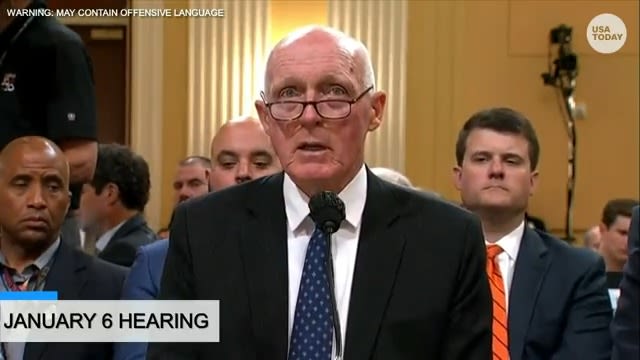



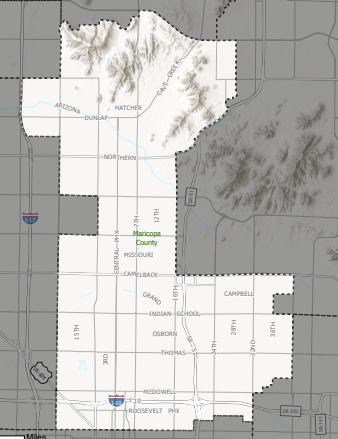


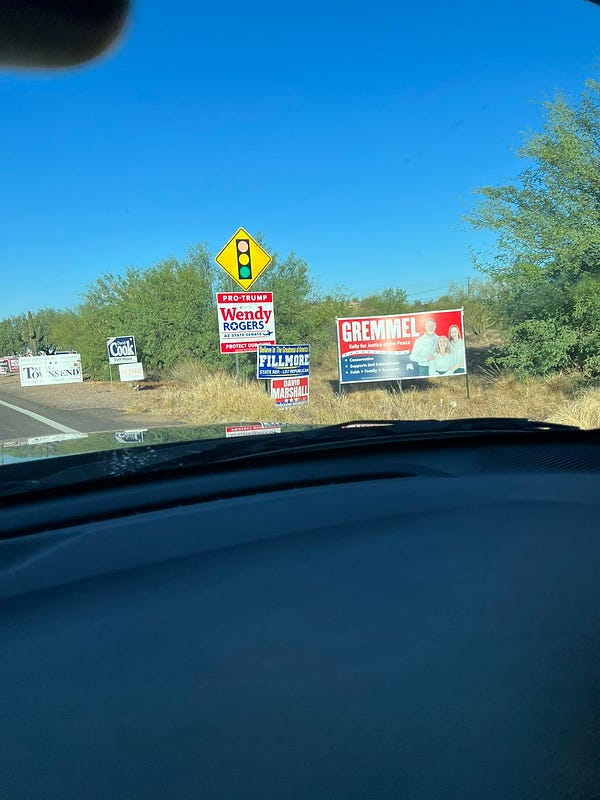
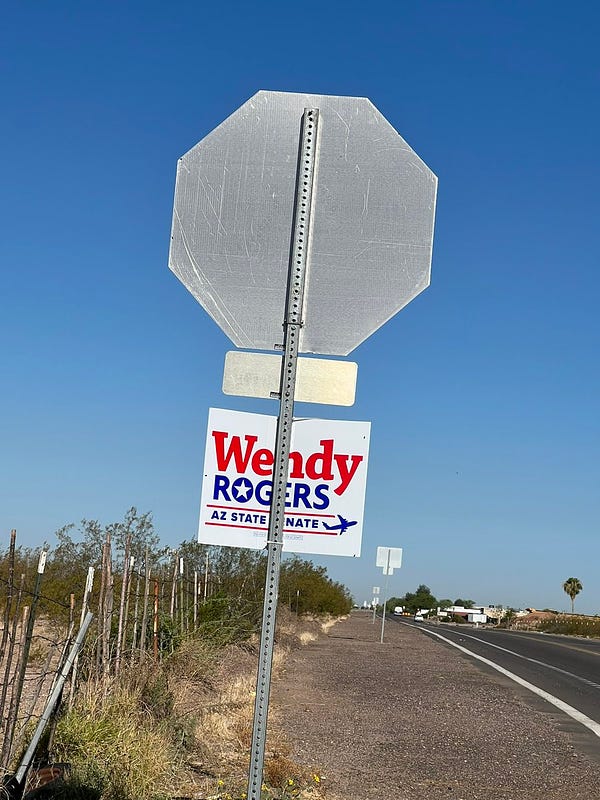
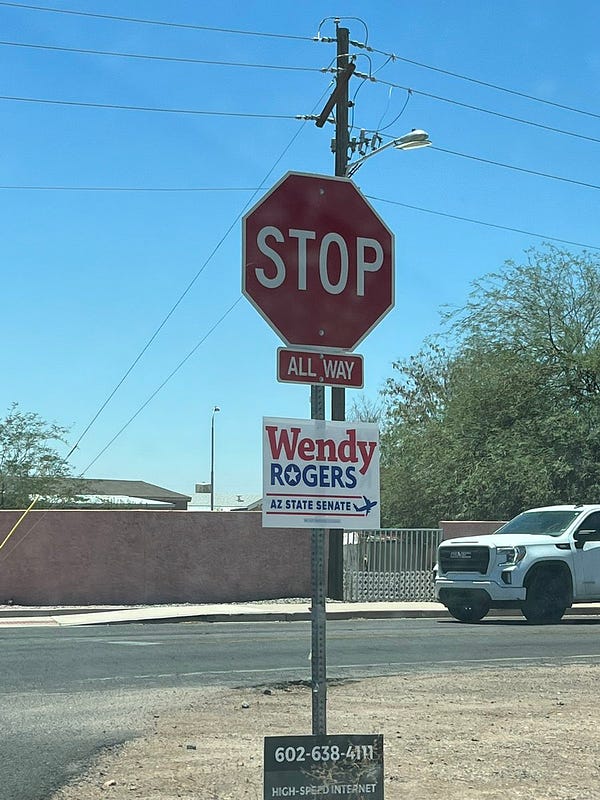

Sorry, what is a “movie tax credit”??